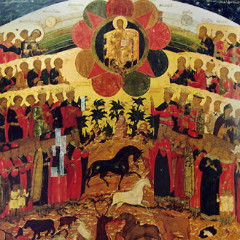
Augustine confesses to God how those Psalms “inflamed” him “with love for you” and how he was “fired to recite them to the whole world, were I able. . . .” His voice would but join the chorus already at work, for he says, “they are sung throughout the world, and no one can hide from your burning heat,” which is also an allusion to Psalm 19.
Augustine is correct. There is nothing so universal in Christian worship, corporate or private, as the Psalms. They are sung throughout the world and have been for millennia. To one degree or another almost all Christians—Protestants, Catholics, Orthodox—have used the Psalter in worship. You can hear their lyrics in ancient hymns and modern praise choruses, sing them from exquisitely bound service books and overhead projectors.
“Here,” says Evelyn Underhill, “Catholic and Covenanter sing from one service book, and acknowledge themselves to be brothers under their skins.”
My own story echoes Underhill’s statement. I was raised in an evangelical church birthed from the Jesus People Movement and the charismatic renewal. Over the years I moved Reformed, then Anglican, and finally Orthodox. The Psalms were with me at every turn. I still smile when I hear the Orthodox chanter recite a line from the Psalter only to have my mind jump back to my childhood and pull up a stray melody that carried those very same words. Just sitting here now, I recall choruses and songs from Psalm 42, 50, 91, 126, and 133. I sometimes catch myself singing them in my car on my way to work.
The universality of the Psalms comes from the power of the Psalms. They are, as Augustine said, a fire that quickens us to worship. You can be in distraction or in the doldrums; it hardly matters. The Psalms can excite. They can bring focus, desire, and praise. This is the reason that many churches, as a couple of people mentioned in the comments earlier, use the Psalms as the call to Sunday worship.
But the Psalms not only call us and incite us to worship, they also teach us to worship. They are the words not only of God, but of Christ, our elder brother who offers those words to God from a perfect heart. The Psalms are elementary school, high school, college, and grad school for Christian spirituality, and Christ is there teaching every course.
To run with that metaphor, nothing beats the Psalms for remedial ed., should you require it as I do. If you struggle in worship and cannot draw up the enthusiasm or desire for it, spend some time in the Psalter. Spend a lot of time, for a few weeks. Try chanting some to yourself. Nothing softens the human heart like the Psalms; nothing makes it feel more vital and alive than the Psalter.
Notice how the Psalms personalize God. He is not a distant Lord. He’s immediate, close at hand. “In my distress I called upon the Lord. . . . From his temple he heard my voice.” Notice how they do not speak of him in lofty categories like Omniscience or Omnipresence, which abstract and depersonalize God. The Psalms speak much more about what God has done and what he will do. They speak of God’s actions—his saving work past, present, and future. How does one worship Omnipotence anyway? Generally speaking, the Psalms don’t bother trying. They focus on God’s might and power in delivering his Anointed and his people.
Because they are the words of Christ, the Psalms pattern the perfect disposition for the human heart. They encourage holiness and repentance by making us aware of our sins, and they show us where to go with those sins. The Psalms teach us to be thankful; the constant reply in the Psalms to God’s saving activity is gratitude. The Psalms also teach us how to trust, because when all is at its worst, when there seems like nothing in life for which to be thankful, they give us example upon example of hoping in God despite lamentable circumstances.
And, best of all, they give us the words to adequately express it all, words that we cannot conjure on our own, words that Christ must teach us, words spoken by him, words spoken by all, yet words that become powerfully and uniquely our own in him.












